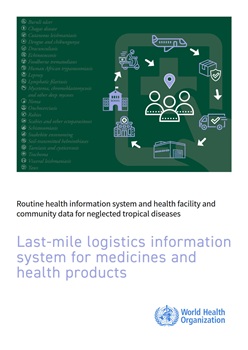Overview
This document on logistics management information systems (LMIS) was developed to address the
increasing need for harmonization and standardization of core indicators for managing medicines and
health products for neglected tropical diseases (NTDs) at country level (i.e. for last-mile logistics). It thereby
responds to requests from Members States, pharmaceutical groups, financial donors and implementing
partners for guidance from the World Health Organization (WHO) for a transparent, standardized reporting
mechanism and key indicators for in-country logistics. More importantly, this document will also guide the
last-mile logistics process and is relevant for the health workforce working at different levels of national
health information systems. It can be adapted and used for any health products depending on the needs
of the country or health programmes.
The donation of NTD medicines and health products by pharmaceutical companies is the backbone of
NTD programmes. However, the supply chain management of these health products is challenged in
many ways, including lack of timely supply chain data visibility, transparency, consistency and traceability;
poor planning of medicines distribution; poor monitoring of medication batches; poor monitoring of
stock on hand at district and sub-district levels; and wastage of medicines. As a result, in most situations,
countries are unable to calculate the remaining balance of medicines following mass drug administration
(MDA) campaign distribution. For example, in many endemic countries, poor forecasting has led to
excess stock of praziquantel while simultaneously running out of albendazole during school-based
deworming campaigns.
In response, WHO has implemented the Joint Application Package process, which enable countries to
accurately request the quantities of medicines needed for their interventions, utilize them efficiently and
report on their use in a timely manner. This approach helps minimize wastage and expiry of requested
medicines. However, for the process to work, countries need to have in place a functional LMIS and the
capacity to effectively manage it. The LMIS needs to have standard logistics key performance indicators;
thus, supporting countries with effective guidance is critical and would contribute to improving efficiency in
supply chain management. If countries implement good last-mile LMISs as outlined in this document, the
information generated will help to complete the important information required for the Joint Application
Package forms, such as outstanding stock balances, expiry status and wastage situations. The standard
logistics key performance indicators outlined in this document can be used when countries develop
their LMIS tools for the last-mile logistics or when integrating them into their existing system. The key
performance indicators are intended as a set of essential, simple metrics for monitoring the distribution
of NTD medicines.

